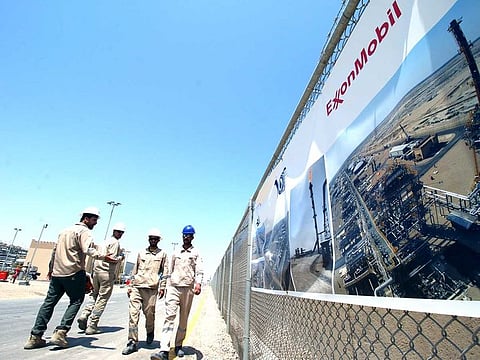Exxon profit slips in Q4 on weak margins
Oil giant Exxon contends with weak margins in chemical and downstream fuels operations

New York: Exxon Mobil’s profit slid more than 5 per cent in the fourth quarter of 2019, as the oil giant dealt with weak margins in its chemical and retail fuel operations.
The country’s largest oil producer posted $5.69 billion (Dh20.8 billion) in profits, or $1.33 per share, for the quarter.
But those profits were boosted by a one-time sale of non-strategic assets in Norway, which lifted earnings by 92 cents per share. Removing the asset sale, per-share profit was 41 cents, shy of the 44 cents analysts polled by Zacks Investment Research were looking for.
A year earlier the Irving, Texas, company earned $6 billion, or $1.41 per share.
Revenue reached $67.17 billion, which was down from $71.9 billion a year earlier.
“Our operations performed well, while short-term supply length in the downstream and chemicals businesses impacted margins and financial results,” said Darren Woods, chairman and CEO of Exxon, in a statement. “Growth in demand for the products that underpin our businesses remains strong. We remain focused on improving our base businesses, driving efficiencies, and optimizing the value of our investment portfolio.”
Crude prices have fallen about 15 per cent since an Iranian missile attack earlier this month on two military bases in Iraq housing American troops. Oil prices have fluctuated widely throughout the year, as tensions in the Middle East and sanctions in Venezuela disrupted global oil supply, while fears of a global economic slowdown put a damper on demand.
The spread of the coronavirus from China to other regions may also drive down energy demand as people and corporations reduce travel, particularly to China. While the situation remains in flux, analysts say global oil demand could be weaker than previous estimates, at least in the short term.
The impact from China could be greater, even if this outbreak is not as serious as the SARS outbreak that emerged in 2002. China made up 16.3 per cent of the world economic output last year, according to the International Monetary Fund. When the SARS outbreak struck nearly two decades ago, China accounted for only 4.3 per cent.
At Exxon, oil-equivalent production was in line with a year ago, at 4 million barrels per day. A 4 per cent increase in liquids was offset by a 5 per cent decrease in gas. Excluding entitlement effects and divestments, liquids production rose 2 per cent on Permian Basin growth, while natural gas volumes fell 4 per cent.



